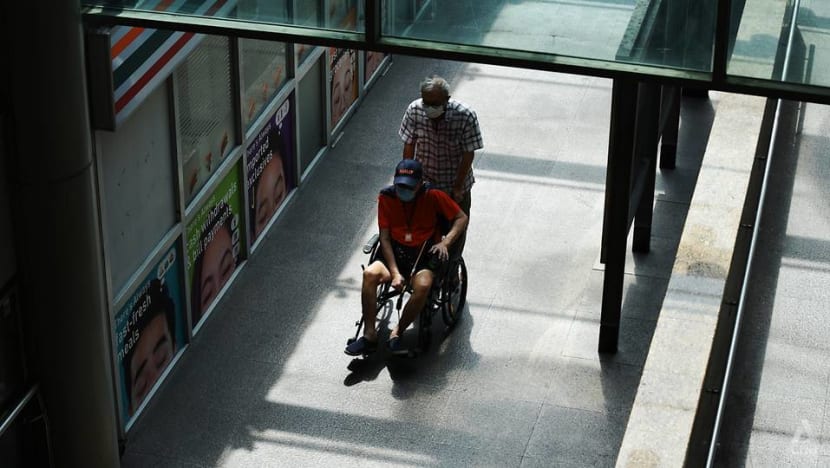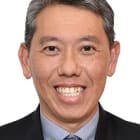Commentary: Preparing ourselves against the phenomenon of tiredness of life in old age
With more attention paid to mental health issues over the years, there are things we can do now to guard against feeling tired of life in the future, say Singapore University of Social Sciences’ Sng Hock Lin and Valerie Ng.

An elderly caregiver pushing a senior in a wheelchair up a ramp. (File photo: Calvin Oh)
SINGAPORE: Talk about feeling tired in Singapore and it’ll most likely be met with comments about how we work too hard and sleep too little.
But a recent commentary by a University of Bath researcher highlighted a different and more concerning type of tiredness. He described the growing phenomenon in Western society of older people growing tired of life, which could be due to loneliness or a fear of becoming completely dependent on others, for example.
Singapore is projected to become super-aged by 2026 when 21 per cent of our occupants are 65 years old and above. And already, about one-third of Singapore teens reported mental health symptoms such as depression, anxiety and loneliness, according to the National University of Singapore ’s Youth Epidemiology and Resilience study released in April.
This is an important finding because our youths of today will become our senior citizens of tomorrow. How do we prepare for old age and lead meaningful lives?
We are all too familiar with the need to save for a rainy day, financially. Based on our experience in regular volunteering with seniors and research in gerontology, we consider three ways we can accumulate other types of reserves needed to guard against feeling tired of life in the future.
A SENSE OF PURPOSE
First, from the social perspective, we may lose a sense of purpose as we age and shed the many roles taken up during our lives.
When parents die before us, we lose our role as children and caregivers. Upon retirement from our full-time job, we lose our work titles and duties. As our children grow up and leave home, we become empty nesters. If our spouse or siblings pass on or move away, we also relinquish some of our responsibilities and, of course, that includes companionship.
Thus, we go from playing many roles and shouldering many responsibilities to slowly having fewer and fewer, perhaps until there are no more roles to play. This may lead to social isolation, which research found could result in adverse health outcomes and higher mortality.
Before we reach that “roleless” stage, we can invest in new roles. One could take up volunteering for a cause we believe in - a role to give us a deeper meaning in our lives.
Gandhi once said: “We find ourselves when we lose ourselves serving others.” Focusing on serving others and the community could create meaning and purpose to energise our lives and stave off feelings of tiredness.
We cannot afford to give up on life when we know we are needed and there is someone who is depending on us to serve them, so to speak.
PSYCHOLOGICAL RESERVES
We can also start building up our psychological reserves. Without oversimplifying the complex issue of mental health, how we approach the present can go a long way to shape how we feel in our old age.
One of us has been volunteering with the elderly close to a decade. He observed from his engagements that two seniors under similar circumstances could have opposite responses to life - reminding him that we may not be able to control life circumstances, but we can choose our response.
One senior he remembered was an 88-year-old, widowed for almost six decades, went through World War II and brought up a few young kids single-handedly. Her resilience is pronounced in her old age. Though she is physically weak, she perseveres to exercise thrice a week doing chair workouts, volunteers in Chinatown (though she lives on one end of the island) where she helps to operate the karaoke machine for senior singing sessions, and joins a group of volunteers to grow and distribute vegetables to the needy. She told me she enjoys keeping herself occupied and taking charge of her life.
According to the continuity theory of normal ageing, older adults will usually maintain the same activities, behaviours, personality traits and relationships as they did in their earlier years of life. This is definitely something we’ve seen in our encounters with seniors.
Another theory is learned helplessness - the feeling of resignation and powerlessness in the face of getting old. Researchers recommend exercising, socialising and making the condition known as some ways to tackle it. We also learnt from our encounters with seniors that when we reach that dependent state, we should put away our pride and allow others to take care of us just like how we have helped others voluntarily.
SOMETHING LARGER THAN OURSELVES
Though ageing tends to be associated with the inevitable physical decline, we can still grow spiritually as we age.
As a secular society, we tend to avoid discourse on spirituality - this sense of being that relates to feelings and beliefs, connecting to something larger than ourselves and thinking beyond our current circumstances. It is not to be confused with religiosity.
Beyond financial savings, we can invest more holistically in our social capital, psychological reserves and spiritual muscles - which ultimately complement one another in increasing our sense of engagement, purpose and resilience so we are not left feeling like we no longer matter.
All the above can only be done if we are physically, emotionally and psychologically abled. And it starts with self-care.
Some caregivers and senior citizens told us they realised that it is only when one is well and healthy that we are able to provide for others and find purpose in living.
As we age, we need to learn to be adaptable like nature and continue in our journey of self-discovery. Learn something new, make a new friend, eat something different, anything that would put a spark in one’s life.
Sng Hock Lin is a PhD in Gerontology candidate at Singapore University of Social Sciences, while Valerie Ng is an Associate Faculty at the same university, teaching youth and adult learners.




















